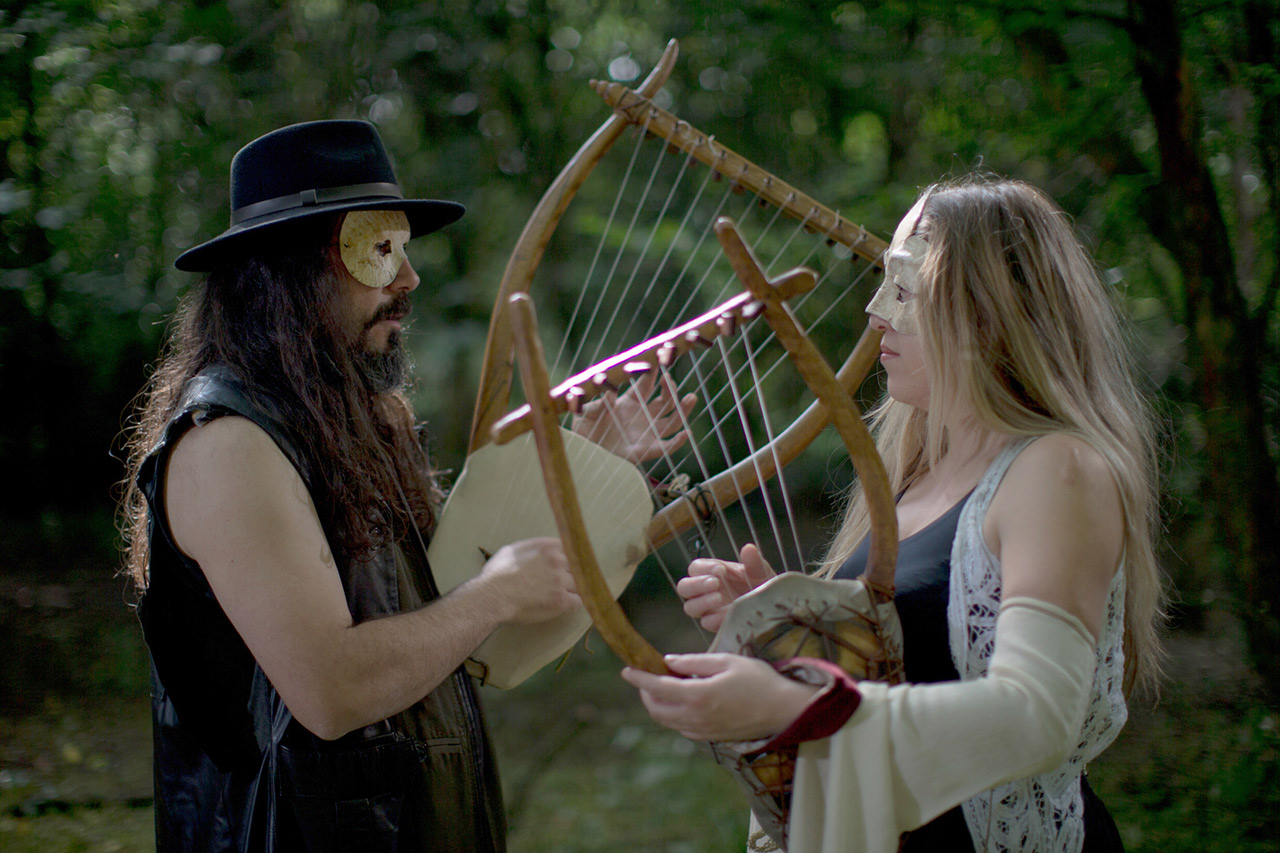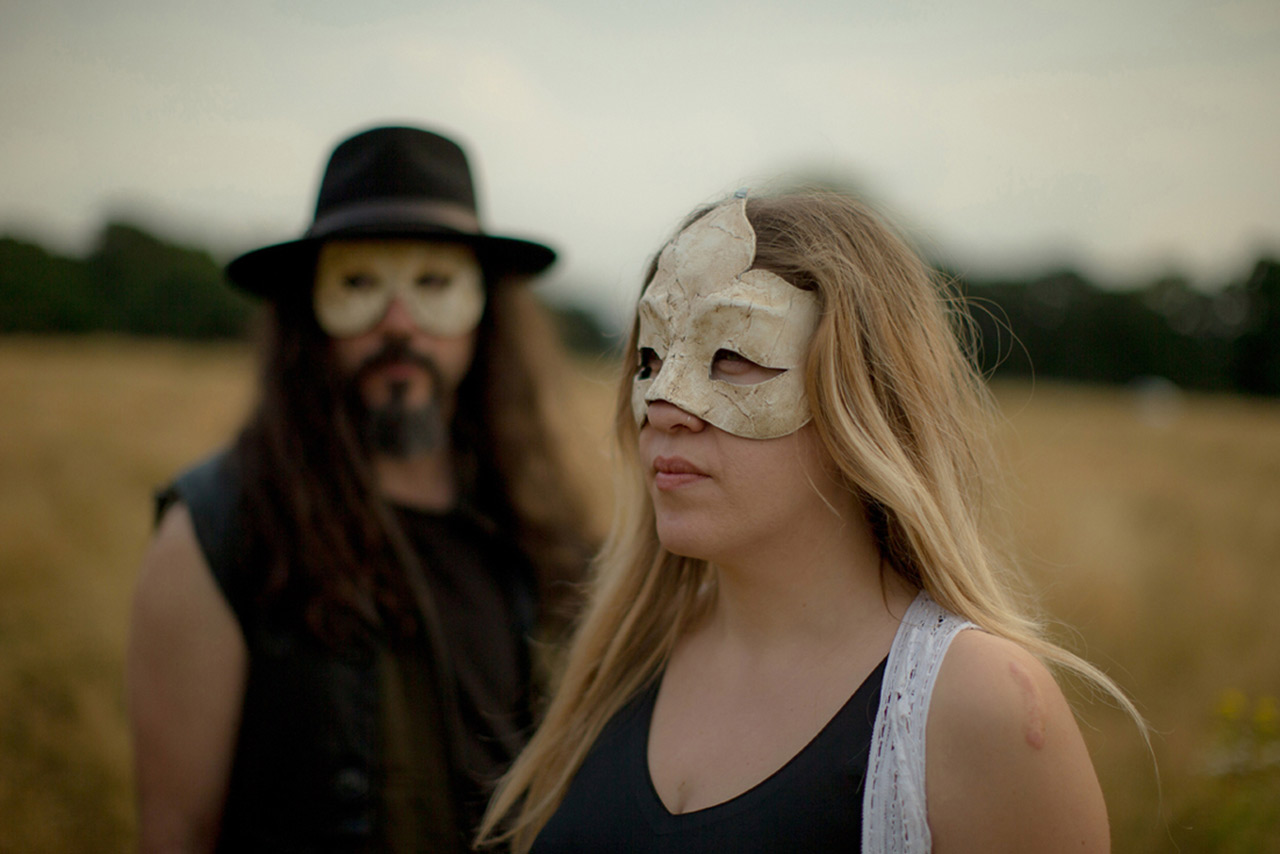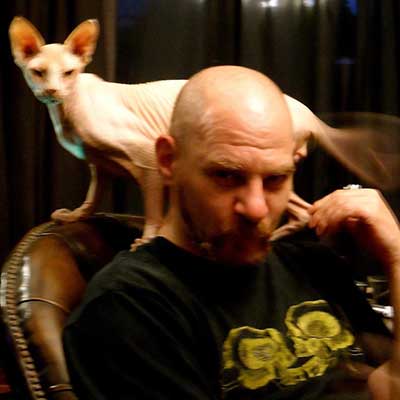Having delved into the spiritual heart of ancient Greece for the past 22 years, Athens ritualistic pagan folk troupe Daemonia Nymphe are about to play their largest, and most spectacular UK show yet when they descend upon the Islington Academy in Angel this Saturday, June 23, with support from Darkher and Prometheus And The Satyrs.
Playing authentic instruments and basing their lyrics on Orphic and Homeric hymns and Sappho's poems for Zeus and Hekate, Daemonia Nymphe’s richly layered, trance-like atmosphere belongs in that sacred, non-metal-that-metalheads-love zone inhabited by the likes of Dead Can Dance, Wardruna and Heilung. Not only are the band a transformative experience on their own terms, the visual theatrics of their lives shows are another route into the kind of universal experience only the most dedicated practitioners of their art, and deepest divers into historical lore can hope to access.
Tickets for the show on Saturday can be bought here, but if you’re not convinced already, we have an in-depth interview with the band below!
This is your largest UK gig, how does that increase the scope of what you can do visually, and what do you have planned for the show that you’ve never been able to do over here before?
“It is indeed our biggest concert ever in the UK and we are very excited about it. Firstly because we will perform pieces from all our albums including the latest score that we composed for Macbeth at the National Theatre Of Northern Greece; secondly because for the first time there will be nine musicians on stage, two puppeteers and two dancers and thirdly because we are playing at the biggest venue that we’ve ever played before in London. We will also have two guest musicians, the fantastic percussionist Peter Ulrich, former member of Dead Can Dance and This Mortal Coil, and the amazing singer Dessislava Stefanova leader of the London Bulgarian Choir, who has sung in Hollywood films such as Troy, 10,000 BC and The Brothers Grimm. Dessislava sung on our Psychostasia album, but it is the first time that she is singing with us on stage, her beautiful vocals are reminiscent of The Mystery Of The Bulgarian Voices.”
Your shows have a strong theatrical element, but theatre wasn’t just about laying out a narrative, its older forms aimed to challenge perception and alter consciousness too. Is that the purpose of your music too?
“In ancient Greece the person who wrote the play also composed the music, wrote the words, made the costumes, created the scenery and also performed himself; being the actor, singer and interpreter at the same time. If we challenge perception and alter consciousness, this is something for the audience to answer. We compose music and perform from the heart and are referring to a contemporary audience just as it used to be in ancient times. Our music refers to all aspects of everyday life, including spiritual elements and ritualistic practices. The theatrical element is something that was required by the music itself, by the ‘ancient’ Greek instruments that we use and by the words that we recite. When we compose, we don’t really think how our music will affect the audience, this is something that happens naturally and we want to believe that there is some kind of artistic dialogue between our work and our listeners.”

With the rise of bands like Wardruna and Heilung, have you noticed an increased interest in pre-Christian cultures, particularly in your homeland? Is there a need for something our modern culture can’t accommodate?
“Daemonia Nymphe started 22 years ago and since the very beginning there was always a big aspect of ritualistic element in our compositions. I remember very well when we were trying to find a label back in 1997, nobody understood what we were doing; they couldn’t even define our music. George of Necromantia (former member of Rotting Christ) had a label at the time and when he listened to our recordings he couldn’t recognise our sound because there were no references to it. It was a long way to go and a hard one I must say, we stood by what we wanted to do with many sacrifices, and here we are still today.
“I didn’t know much about Wardruna until we met them in the USA where we performed at the same festival. I am pleased that they are getting so much support from the audience and the media. Producing music for TV series such as the ‘Vikings’, (or in our case, we were asked to compose and perform music for the new Assassin’s Creed game) brings this music to a wider audience. |I still think that there isn’t really a scene, although we believe that we follow the same ethos, to create art that we believe in.
“In Greece things are very complicated, there is a big identity crisis and there always has been, caused mainly by the established religion which has a big say in our view of the world, influencing people’s perception and confusing even more our relationship with our ancient past.
“I don’t know if there is a need for something different from modern culture, although everybody needs to find their own path without a superstitious perception. The only thing that we can gain from our past is to learn about human behaviour, our mistakes and our achievements; knowing our past helps us understand where we stand in the present and in the future.”
Your sound is rooted in Ancient Greek music, but how much research and study has gone into that source over the years? For Daemonia Nymphe, how do you balance having an authentic understanding of the music with creating your own interpretation?
“Our research is endless, still today we learn new things about this music. Of course this is a very big matter and really difficult to discuss in depth here. When we talk about ancient Greek music, what exactly do we mean? Which era, period are we referring to? Are we talking about secular music, theatre music, chorus music, religious or something else? It is very interesting to state here that in classical Athens for example, there were lyres (lyra) built every day for students, as music was compulsory in Greek education, and the ‘ancient’ Greek lyra at that time was as common as the guitar is today. None of the ancient lyres survived in Greece, at least there aren’t any exhibited at the Greek museums. Funnily enough, the only authentic one that exists today is exhibited at the British Museum. So, when we received the reproductions of ancient Greek instruments by Nikolaos Brass, we had to explore their sound just as we would with new instruments, because in fact, they were indeed ‘new’. Their sound was old and new at the same time; we started building a relationship with them, we were researching the music and the instruments, and experimenting with the sounds of the lyra, the barbitos and the kitharis among many others.
“We started finding new ways to perform with them, combining them with contemporary instruments and this resulted in achieving a palette of new unexplored sounds.”
Darkher is a very complementary artist. What parallels do you feel you share with her?
“We found out about Darkher’s music when Einar invited us to Wardruna’s concert at the Union Chapel. Darkher’s music is ethereal and very atmospheric; her vocals are divine and are something that we are very fond of. Please allow me here to introduce Prometheus And The Satyrs, the other support act, their identity is unclear, their peculiarity is profoundly evident, they start at 18:30 and are also not to be missed.”
Daemonia Nymphe play the O2 Islington Academy on Saturday June 23. Tickets are available here.
Check out their Facebook page here and and their homepage here!

